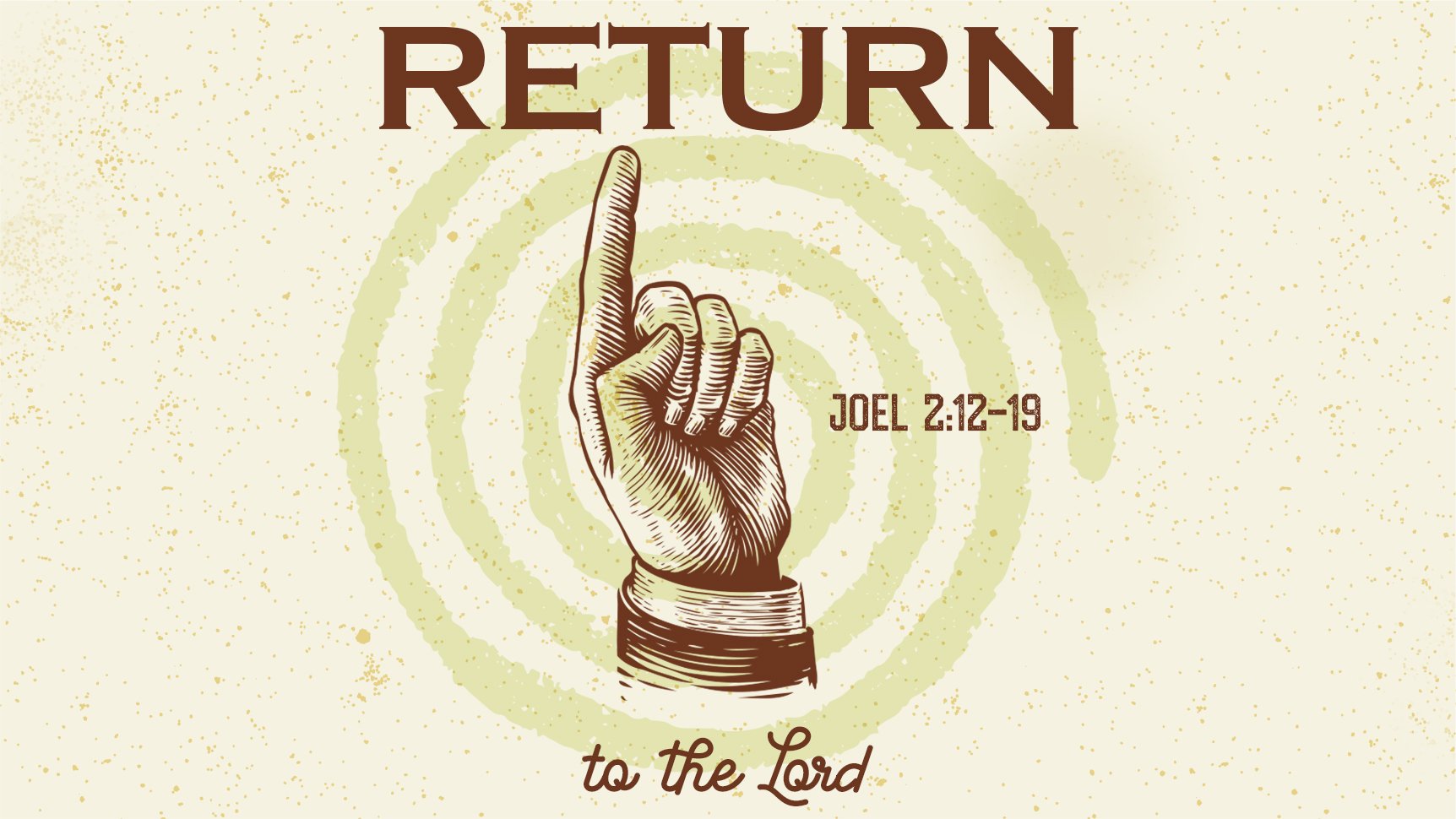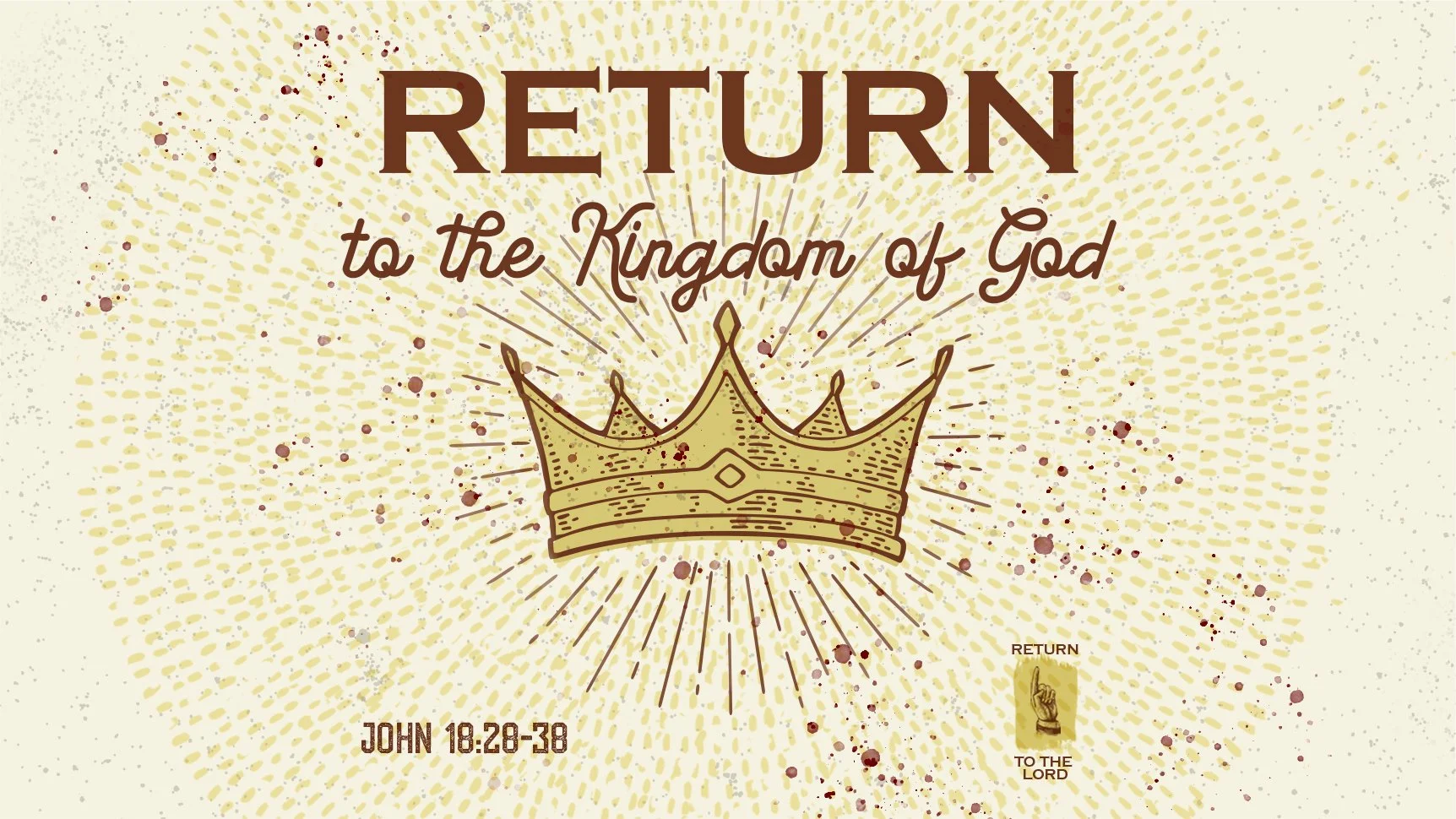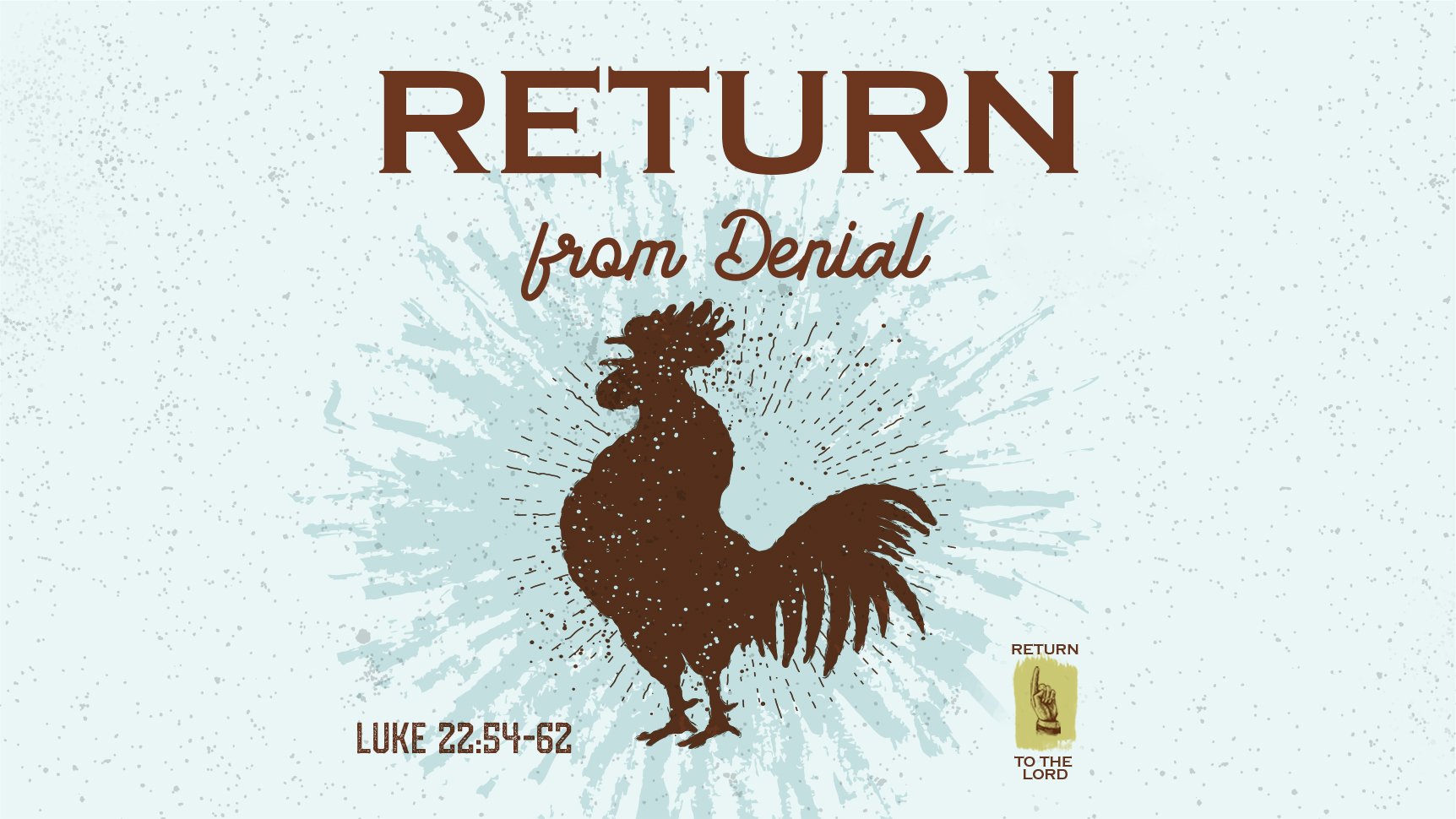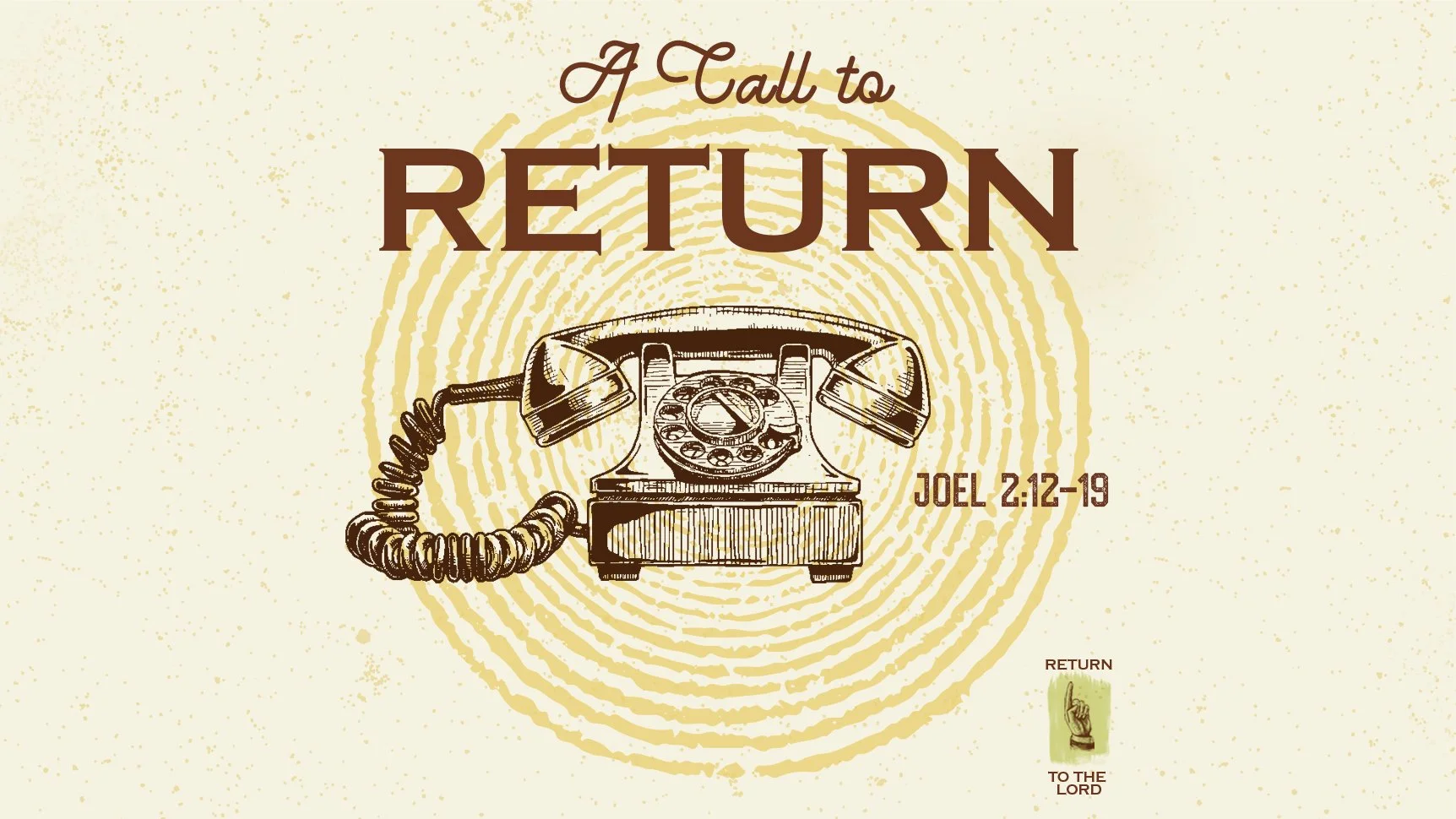Return from Denial | Eighteenth Sunday after Pentecost | Luke 22:54-62
“...Return to the Lord your God,
for he is gracious and merciful,
slow to anger, and abounding in steadfast love...”
October 9 | 10:45 a.m.
Eighteenth Sunday After Pentecost
READINGS
Psalm 118:19-29
Isaiah 59:1-3, 12-13
1 Peter 5:6-10
Luke 22:54-62
message presented by Rev. Frank C. Ruffatto
+Points to ponder
- Have you ever denied to someone your faith in Christ? Why do you think you did (or didn’t)? Does the Word in this sermon bring you comfort?
- What are some of the subtle ways we deny our faith in Jesus?
- How can we encourage each other to boldly proclaim our faith in Jesus
+Sermon Transcript
Grace, mercy, and peace be unto each of you from God our Father and our Lord and King, Jesus the Christ. Amen.
Let us pray: O Lord who dwells in the hearts of His people: give us true peace and mutual love; through Jesus Christ our Lord. Amen.
Some twenty years or so ago, “Chinese officials from the Public Security Bureau invaded a Sunday school room at a church. They found thirty children inside and herded them into a van. Despite the scary situation, one child started to sing. In a few moments, all the children were singing.
Upon arrival at the police station, the children marched bravely into the interrogation room, still singing to the Lord. The Chinese officers attempted to force the children to write, ‘I do not believe in Jesus,’ telling them that they had to write it a hundred times before they would be released. Instead, the children wrote: ‘I believe in Jesus today. I will believe in Jesus tomorrow. I will believe in Jesus forever!’
Exasperated, the officials called the children’s parents, some of whom renounced Christ. However, one widow refused to deny Jesus when she came to pick up her twin sons. The officers threatened her, saying, ‘If you do not deny Jesus, we will not release your sons.’
She [decidedly] replied, ‘Well, I guess you will just have to keep them, because without Jesus, there would be no way for me to take care of them!’ The exasperated officials said to her, ‘Take your sons and go!’”
This seems absurd to us here in the United States; and we probably take that for granted. But are we ready to sing or proclaim loudly – in a world and in a culture that despises Jesus – to sing or proclaim loudly that we belong to Him, or will we sit on the seat of plausible deniability. Of course, only you can answer that for yourself. Today’s Gospel is all about this kind of denial and what Jesus has done about it.
The evening had absolutely run off the rails. It had started off so well! The camaraderie of being with His friends; the warmth of their fellowship; the joy of being with their Master and hearing all that He had to say – it was all wonderful. One of those moments that just kind of freeze in your memory and make you happy just to think about them.
But it started to slip when Jesus made that comment about one of them betraying Him. That sent a ripple through the group. Men looked with suspicion on one another, wondering who would do such a thing.
Oh, and then the argument about who was the greatest. So stupid! As usual, though, Jesus turned it into a teachable moment. The astonishing things that man said! “The kings of the Gentiles exercise lordship over them, and those in authority over them are called benefactors. But not so with you.” He encouraged them to do everything upside down. “Let the greatest among you become as the youngest, and the leader as one who serves.”
For Peter, it really got awkward when Jesus leaned over with a troubled look on His face and said that Satan had demanded him, but Jesus had prayed for him. Peter was aghast. “Lord, I am ready to go with You both to prison and to death.” But Jesus knew better. He said that Peter would three times deny that he even knew Jesus, all before the rooster crowed.
And if that weren’t enough to completely wreck the evening, when they went to the Mount of Olives for Jesus to pray, the disciples fell asleep while they were waiting. They couldn’t help it; they were just worn out after everything that had gone on, and they were still trying to process what Jesus had said was coming for Him and for them.
But then it got worse. There were soldiers. Judas Iscariot had led them in. And the chaos that followed was unbelievable. That servant of the high priest got his ear cut off in the melee! But Jesus shut it down. He even healed the guy’s ear. It didn’t matter. They arrested Him. They dragged Him to the high priest’s house.
And Peter couldn’t help himself. He followed. He had to see what was going to happen. Had to do something, even if it was just to follow along and see it for himself. As he stood in the courtyard, Peter could see Jesus with the Council inside. It didn’t sound like it was going well at all. In fact, Jesus was barely talking. He just kind of stood there and took it.
Peter had moved close to the fire to warm himself, but he wasn’t really paying attention to what was going on around him. His attention was laser-focused on what was going on inside. He didn’t notice the girl sitting next to him, studying his face intently, until she blurted out, “This man also was with Him.”
How startling! Peter jumped. He turned to her, and for the first time Peter took stock of where he was. He looked around at the crowd gathered in that courtyard and realized that these folks weren’t all that friendly to his group of friends. He hoped to shut her down without drawing further attention to himself. He looked at her and quietly said, “Oh, no, ma’am. I don’t even know Him.” That seemed to satisfy her, so he returned to watching the events unfold inside.
There was more arguing. Raised voices and accusations were being shouted across the room. Peter shivered; he wasn’t sure whether it was from the chill in the air or from a chill of foreboding. That pesky woman had moved on, but a young man had taken her spot and was looking at Peter. “You’re one of them too!”
Peter was a little irritated. He needed these people to quit interrupting his concentration. He was trying to hear what was happening to Jesus. So, he barked, “Man, I am not.” The young man seemed to take that at face value and walked away, although Peter noticed him a little later whispering with a group of men off in the corner of the courtyard. Still, his eyes were riveted on Jesus and the proceedings inside.
Time passed. It was late at night or maybe even early in morning; Peter had lost track of time. He couldn’t tell exactly what was happening, but it didn’t seem good. There was a lot of yelling. The high priest had been carrying on for a while and was obviously agitated.
That’s when it happened.
From across the courtyard, the voice rang out. As soon as the man began speaking, Peter knew it was about him. He was standing and pointing at Peter: “I’m telling you, this guy was with Him! I heard him talking earlier, and he is definitely from Galilee; his accent gives him away.” All eyes turned to Peter. He wasn’t sure how to react, what to say.
What if they realized he really was with Jesus? Would they arrest him too? He didn’t know, and he didn’t want to find out. He figured if he responded aggressively, maybe they would stop saying it. “Man. I. Do. Not. Know. What. You. Are. Talking. About!” Peter spat out each word in turn, hoping this guy would just back down. The courtyard grew quiet, and Peter heard a rooster crowing in the distance. Peter just glared at his accuser for a moment and then turned to see what was going on inside.
It was like Jesus knew what was happening outside, even though He was up to his neck with the Council inside. Slowly, He turned and made eye contact with Peter. His eyes were sad, even accusing. And Peter remembered what He had said about denying Him three times before the rooster crowed.
Tears welled up in Peter’s eyes as he pushed through the crowd. He had to get out of that place. He couldn’t face Jesus after what he had just done. He was so embarrassed. So, well, lost. What did this mean?
How often do you do the same thing? Fail to acknowledge your faith in public because you’re fearful of how people will react. Or join the crowd in mocking another believer because you don’t want to be seen as different. You deny the One who died for your sins without even realizing you’ve done it.
But when you see it, the guilt can be overwhelming. It may be hard to even step into the church, knowing what a hypocrite you have been. Can a wretch like me even be saved?
The answer, dear brothers and sisters, is simple: Yes.
After His resurrection, Jesus confronted Peter and his denial. He did it in the form of a question, asked three times: “Do you love Me?” And Peter responded affirmatively every time. “Then you’ve got work to do. Tend My flock, feed My sheep, and build them up.” See, Jesus has already dealt with the denial. He took it to the cross along with all the other sins you’ve committed, along with all the sins I’ve committed, along with the sins of the whole world.
Do you love Him? Then you’ve also got work to do. Share this Good News. Tell other people about it. Don’t shrink from claiming your Lord and Savior in public! He has called you to return from your denial because He is gracious and merciful, slow to anger, abounding in steadfast love, and because He relents over disaster. Beloved, your salvation is a done deal. You are a forgiven child of God. Because just as He said, “It is finished.” Amen.
“May the God of hope fill you with all joy and peace in believing, so that by the power of the Holy Spirit you may abound in hope.”
ABOUT THE SERIES
In the Book of Joel, the prophet paints a vivid picture of the coming judgment of God, the Day of the Lord. The imagery is bold and terrifying. Joel’s prophecy has teeth even today as wars rage, natural disasters threaten and destroy, and our culture seems to be unraveling.
But right in the middle of this frightening portent, we find a tender invitation from the Lord: “Return to the Lord your God, for He is gracious and merciful, slow to anger, and abounding in steadfast love; and He relents over disaster” (Joel 2:13). God’s invitation and promise finds its fullness in Jesus Christ, who personifies and accomplishes all that God declares.
During this series, we will consider the theme “Return to the Lord” and examine how the call to return played out in practical ways for the people who walked alongside Christ as He demonstrated and carried out God’s grace and mercy on our behalf, taking God’s wrath upon Himself, setting the stage for God to “turn and relent, and leave a blessing behind Him” (Joel 2:14).
Join us for the Return to the Lord series at Redeemer.











